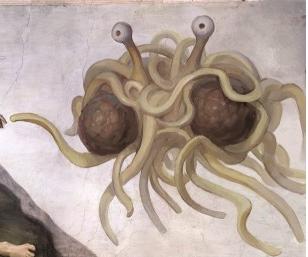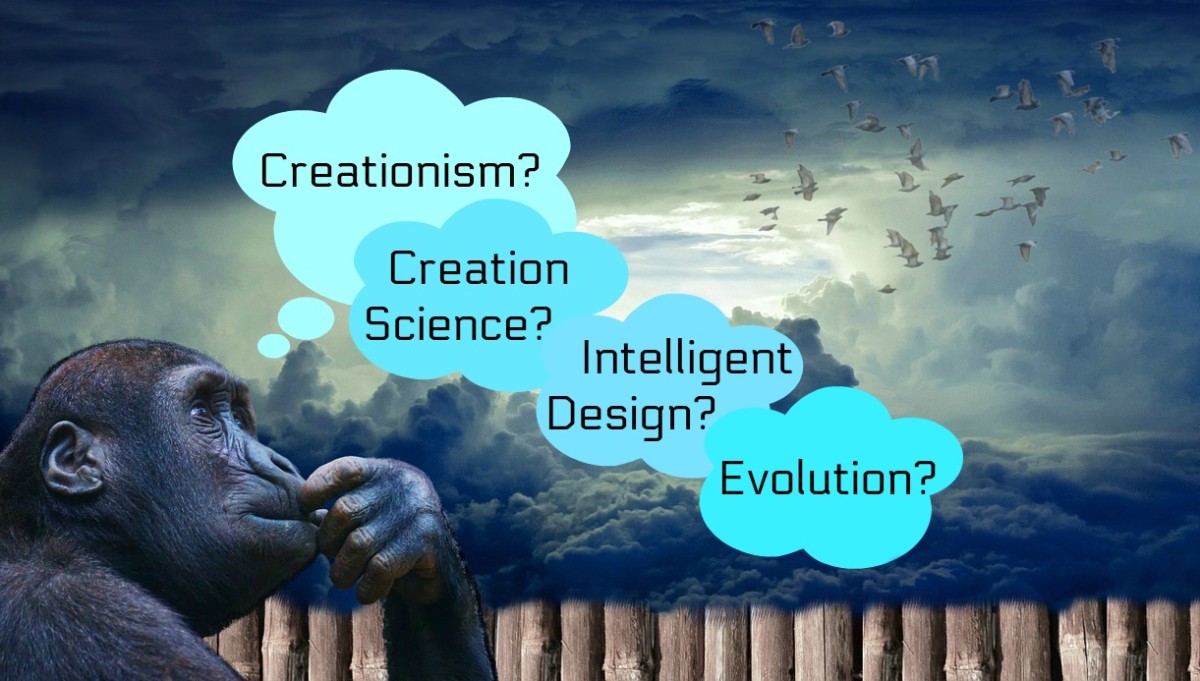In Defense of the Flying Spaghetti Monster

(Disclaimer: This article intends to examine the Flying Spaghetti Monster as a fictional concept, and is not intended to be a parody.)
From what I understand, the birth of the figure, known as the Flying Spaghetti Monster (FSM), goes something like this. Some theists (often Christians) believe that creationism should be taught to school children alongside evolution. Intelligent Design is the idea that a powerful being, or deity, created the universe and everything we see in it. Numerous scientists and non-theists are understandably concerned by this as the study of science is more than just evolution. So, when a school board was considering the addition of creationism into their curriculum, one man wrote to the board likening the evidence for god to a flying spaghetti monster. In other words, there is no evidence for either, therefore they are on the same believability scale and, therefore, shouldn’t be taught in science classrooms. The letter he wrote was available online and the noodle deity went viral as a tongue and cheek nod to the flaws in creationism and theism.
I remember a similar argument from my philosophy class in college, though that example stated that a teapot was orbiting Saturn. The idea was that we couldn’t disprove the teapot theory, even if it seemed unlikely. Modern advancements in space travel will probably, one day, disprove the teapot theory, but god isn’t measurable the way a teapot is. So, no matter how far along science gets, it will probably never prove there is no god. However, just because god cannot be disproven, it doesn’t mean he can be proven either. Which is where the Flying Spaghetti Monster comes in. If one can exist because it cannot be disproven, why can’t the other?

There was a question I asked here on HubPages a while back that stated “Can you prove the Flying Spaghetti Monster doesn’t exist?” The reason I asked this particular question was because it’s opposite was a frequent post in the Q&A section. A theist would ask “Can you prove god doesn’t exist” and, when atheists failed to do so, the poster would claim victory on the side of god. Since the Flying Spaghetti Monster similarly can’t be disproven, I figured I would see what sort of answers I would get. Most responses were those who participated in the ruse, insisting that the FSM is real. While the others firmly stated that he wasn’t, even though it wasn’t possible to disprove him. So, why would a theist disregard the FSM but still believe in god? To figure this out, we are going to have to break down each one. It should be noted, however, that miracles and faith cannot be used to support either. The reason being is that these things don’t come with a signature and a miracle could have been caused by the FSM just as much by god.
The first and most obvious flaw with the Flying Spaghetti Monster is that we know who created him and why he did it. It was conceived of as an extreme parody to make a point, and not a real messiah. Similarly, spaghetti is a man-made food that doesn’t exist naturally, in much the same way that the teapot is man-made. Based on this information we can reasonably assume that the FSM does not exist. However, we cannot definitively prove it.
God and other deities have a leg up in this regard. Time has distanced us from the original writings, which means data on the creation of the bible, and other holy books, is limited. There are some histories that match up, and writings that were preserved remarkably well. But, ultimately, we will never know what happened during that time. Also many religious books incorporate things that can exist in nature, like apples, snakes, bushes and a human version of their god. This makes it easier to identify with than a flying ball of noodles. Religion’s age is also an advantage because it has had the time to spread. It’s very easy to assume that something is right when the majority of the world believes it. However, popularity does not equate the truth. And, despite god’s age and mystery, he cannot be definitively proven either.
So, let’s imagine that the creator of the FSM was born two thousand years ago. And, let’s imagine that the FSM was depicted as a human wheat farmer that preached a message of personal empowerment. How would we regard that mythology today? Would it be easier to accept? There is a quote by Penn Jillette that states “If every trace of any single religion were wiped out and nothing were passed on, it would never be created exactly that way again. There might be some other nonsense in its place, but not that exact nonsense. If all of science were wiped out, it would still be true and someone would find a way to figure it all out again.”
There is certainly something to be said about the consistency in the rules of science. If we forgot the world was round, it would still be round. If we forgot the laws of gravity, they would still hold us to the Earth. And if we forgot the scientific method, something remarkably similar would take its place. That’s not to say that all science always matches up perfectly, but the idea is that its concepts are things that can be rediscovered over and over again. By contrast, religion relies exclusively on its holy books and verbal storytelling. The mythology of Jesus cannot be rediscovered without a second visit from god. And, since divine visitation is non-existent in the modern world, we can only move forward without a deity.

I often liken the Flying Spaghetti Monster to Stephen Colbert. His program was designed as a parody for the extreme, and often silly, newscasters on 24 hour news networks. By taking such an approach he has been able to shine a light on various practices that the public would have otherwise known nothing about. The FSM is another such parody, designed to shine a light on the cracks in theism and certain religions. While some might interpret its presence as an insult or an offense to believers, I think it’s more valuable as a critique. The downside of old world religions is that they are dragging outdated concepts with them. Bigotry towards women, homosexuals and other races should never be passed to new generations. So the Flying Spaghetti Monster should be regarded as a wake up call; an opportunity to update religion. There are many good humanitarian efforts that come from organizations like these and theism is a valuable comfort when we lose those we love. But we need to take the positives and discard what doesn’t work anymore. Otherwise the FSM will continue to get more popular and god will become that much more of a joke.







